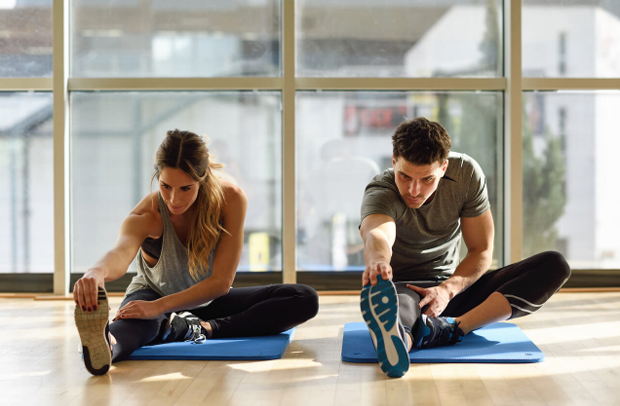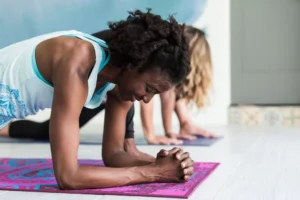People often think that stretching is just a way to warm up or cool down before or after exercise, but it actually does so much more. With this simple exercise, you can transform the way your body feels and functions every day. Whether you’re an athlete, sit at a desk all day, or just want to feel better, stretching can undoubtedly benefit you. Yoga not only improves flexibility but also effectively relieves stress, calms the mind, and improves overall well-being. Just one or two minutes of stretching a day can significantly improve the way you move, feel, and cope with life’s challenges.
How Stretching Helps Improve Flexibility
When you say you’re flexible, you mean that your muscles and joints can move in all possible ways. Tight muscles make movement difficult, and everyday movements like twisting, stretching, and reaching can be painful. Regular stretching gradually lengthens your muscles, making them more flexible and stronger. This exercise will make you more flexible over time, making movements easier and less strenuous. A more flexible body also reduces the risk of injury because your muscles and joints are better equipped to withstand quick movements or changes in direction. Maintaining flexibility can help you develop better posture, balance, and rhythm, all of which are beneficial in daily life and during sports.
How Stretching Helps Relieve Muscle Tension
These days, people sit for long periods of time, performing the same repetitive tasks with minimal movement, which can lead to muscle stiffness and pain. Stretching directly addresses this problem by relieving muscle tension. Stretching lengthens muscle fibers, increases blood flow, and transports oxygen and nutrients to the tissues. This process relieves pain and stiffness, making your body feel lighter and more relaxed. Stretching your neck, shoulders, and lower back can help desk workers relieve the tension caused by poor posture or prolonged sitting.
Stretching is a natural way to relieve stress
Stress can change both your body and your mind. When you’re anxious, your muscles unconsciously tense, leading to pain, headaches, and even fatigue. Stretching can help you relax, focus on your body, and release stress. Slow movements encourage deep breathing, calm the nervous system, and reduce stress hormones like cortisol. Stretching helps you stay mindful, let go of worries, and focus on the present moment. Stretching is a great way to manage stress and improve your mental health because it relaxes both your body and mind.
How Stretching Helps You Stand Up Straighter
Poor posture often results from slouching, using electronic devices, or sitting in the same place for extended periods. Over time, these habits can disrupt muscle balance, leading to stiffness and pain. Stretching can help address these problems by strengthening muscles and stretching tight muscles. For example, chest stretches can help correct the hunched posture caused by computer use, while hip stretches can help loosen stiff hips. Stretching not only makes you feel better but also increases your confidence and energy. A wider back and a taller posture can make you feel better about yourself and how others perceive you.
Stretching can also help you sleep better
Stretching also promotes sleep, which is a significant benefit. Many people struggle to sleep well at night because their bodies are tense or their minds race, causing them to toss and turn. Light stretching before bed can loosen your muscles, lower your heart rate, and prepare your body for rest. When you combine stretching with deep breathing, it becomes a habit, calms you, and signals to your body that it’s time to relax. Studies show that people who stretch before bed fall asleep faster, sleep longer, and wake up less stiff in the morning. A good night’s sleep is crucial for your overall health, and stretching is a simple and natural way to improve it.
Stretching and Stimulating Circulation
Your muscles and organs need good circulation to stay healthy. When circulation is limited, muscles are more susceptible to fatigue and pain. Stretching helps improve circulation by allowing blood to flow more easily through muscles and organs. Improved circulation transports oxygen and nutrients more efficiently to cells, which accelerates healing and promotes muscle growth.
Connect your mind and body more deeply. By focusing on the sensations of stretching, you can more easily identify areas of tension or imbalance. Greater awareness helps you better understand your body’s needs and take better care of it. Yoga and many other forms of stretching combine breathing exercises and meditation with physical activity to sharpen your inner awareness. This holistic approach not only makes you stronger and more flexible, but also strengthens your emotions and provides clarity.
Frequently Asked Questions about Stretching
Question 1: How often should I stretch to feel better?
You can experience the benefits of stretching a few times a week, but stretching daily is the best way to maintain flexibility and reduce stress. A little stretching every day really helps.
Should you stretch before or after exercise?
Before exercise, dynamic stretching is best for warming up muscles. After exercise, static stretching helps cool muscles down and reduce muscle soreness. Both types of stretching are beneficial when performed at the right time.
Question 3: Can stretching replace other exercises?
Stretching can be beneficial, but it should not replace strength training or other exercises. It works well with other forms of exercise because it improves flexibility, prevents injuries, and promotes recovery.
Question 4: When is the best time to stretch?
Any time is a good time to stretch. Stretching in the morning can help you wake up, while stretching in the evening helps you rest and sleep better. The best time to stretch is when it fits best into your daily routine.
Question 5: Can stretching relieve long-term pain?
Yes, stretching can relieve chronic pain, especially pain caused by poor posture or muscle tension. However, it is advisable for people with health conditions to consult a doctor before starting a stretching program.
Summary
Stretching has many benefits for both physical and mental health and is a simple and effective method. It improves flexibility, relieves muscle tension, and calms the nervous system, allowing you to live a better and more balanced life. It improves your balance, circulation, and sleep quality, and naturally relieves stress. Best of all, stretching is easy for everyone because it can be done anywhere and requires no special equipment. A few minutes of stretching in the morning, during a work break, or before bed is no problem. Daily stretching is good for your physical and mental health in the long run. By creating a routine, you’ll not only move more easily but also feel calmer, more energetic, and ready to take on the challenges of daily life.




